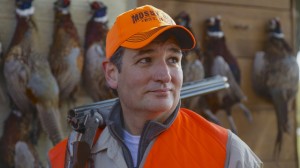
Sen. Ted Cruz (R-TX) stands in front of pheasants that were shot during a hunt hosted by Rep. Steve King (R-IA) on Saturday, Oct. 26, 2013, in Akron, Iowa. Cruz attended the Iowa GOP's annual fundraising dinner in Des Moines, Iowa, on Friday. (Photo by Nati Harnik/AP)
Much of our political dysfunction arises from the fact that different parts of the electorate turn out to vote during midterm and presidential elections. Democrats rack up big wins in presidential years, when younger voters and people of color turn out in force, but Republicans do well in midterms, when the electorate tends to be older and whiter and their base turns out at the polls more reliably than the Democratic coalition’s. Both parties believe that their victories give them a mandate to govern.
According to the latest NBC/Wall Street Journal poll, 47 percent of voters overall expressed a high amount of interest in the 2014 midterms. But while somewhat fewer Democrats — 43 percent — were as interested, over half of all Republicans — including an impressive 71 percent of Republicans that identify with the tea party — said the midterms were very much on their minds.
An enormous amount of ink has been devoted to this dynamic. Two new articles look at it from very different angles.
First, Sasha Issenberg, author of The Victory Lab, the definitive account of how numbers-crunchers are applying new analytic techniques to winning elections, writes in The New Republic about how Democrats can possibly avoid their “midterm curse.”
Issenberg writes:
In late February, Barack Obama stood before a room of his party’s governors at a Washington fund-raiser and offered a new explanation for the Republican rout that claimed the jobs of more than 750 Democratic officeholders around the country in 2010. At the time, the president had described the outcome, simply and indelibly, as a “shellacking,” but here he ventured a deeper analysis. “We know how to win national elections,” he told the crowd. “But all too often it’s during these midterms where we end up getting ourselves into trouble, because I guess we don’t think it’s sexy enough.”
Beyond the narcissism implied—the suggestion that any ballot without his name on it lacks a certain magnetism—Obama was onto something. Current conventional wisdom holds that Democrats’ prospects this November are grim. After the obligatory acknowledgment that the party in the White House almost always loses ground in off-year elections, the most commonly cited reasons are situational—the botched Obamacare rollout, a zealous conservative base, the fact that these midterms follow a redistricting process largely controlled by Republicans, the preponderance of competitive Senate races in states that lean red. And yet Obama’s diagnosis of Democrats’ midterm woes comes closer to the truth. The party is suffering from a chronic condition, not a short-term malaise. In fact, the very phenomenon that sustained Obama’s own victories is the one that may doom his party in midterm elections for the rest of his life. The dynamic so cripples Democrats’ off-year performance that in 2018, a President Jeb Bush or Rand Paul could see Republicans actually pick up seats.
The rest of the piece considers various theories that might explain this phenomenon, and offers Issenberg’s prescription for Dems: Rally their base with some progressive populism. Read it at The New Republic.
On the other side of the partisan aisle, things look very different. Republican officials are brimming with confidence as they approach the midterms. And in The Washington Post, Matea Gold reports that while tea party groups are enjoying a fundraising bonanza, some of them aren’t spending very much on actual elections.
Gold writes:
When the Tea Party Patriots threw its support last month behind Matt Bevin, the underdog conservative challenger trying to unseat top Senate Republican Mitch McConnell, President Jenny Beth Martin vowed the group would be “putting our money where our mouth is.”So far, its super PAC has mustered just $56,000 worth of mailers in Kentucky on Bevin’s behalf — less than half the amount it has paid Martin in consulting fees since July.
The Tea Party Patriots Citizens Fund, which blew through nearly $2 million on expenses such as fundraising, polling and consultants in the first three months of this year, is not alone in its meager spending on candidates. A Washington Post analysis found that some of the top national tea party groups engaged in this year’s midterm elections have put just a tiny fraction of their money directly into boosting the candidates they’ve endorsed.
The practice is not unusual in the freewheeling world of big-money political groups, but it runs counter to the ethos of the tea party movement, which sprouted five years ago amid anger on the right over wasteful government spending. And it contrasts with the urgent appeals tea party groups have made to their base of small donors, many of whom repeatedly contribute after being promised that their money will help elect conservative politicians.
Read the rest at The Washington Post.

